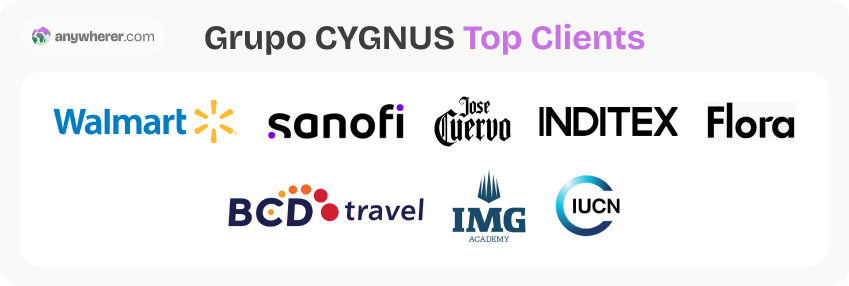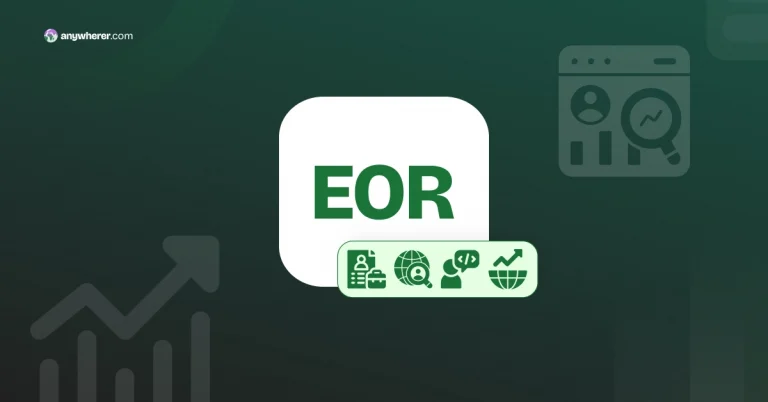Many companies decide to hire staff in Mexico due to their large talent pool, generally lower cost of living than in the US and many European countries, as well as for their efforts in tech innovation. But simply outsourcing isn’t the way for all companies, and setting up a legal entity comes with many complications.
Foreign legal systems always come with nuances you can’t account for without specialized knowledge. And all the steps of entering a new market, from establishing an office to getting the document in order, can take much more time than it would prove profitable.
So, is there any way to alleviate the complexities of international hiring in Mexico? Of course, partnering with an Employer of Record provider helps overcome these hurdles. In this article, we will take a look at the challenges that companies usually face when hiring in Mexico, the legal implications of doing business in the country, as well as how exactly EOR services help turn the tables.
Facts and Stats About Mexico’s Labor Market
Mexico is an attractive business destination for many companies across the world looking to expand, as well as for individual foreign investors. It has ranked 58th among 139 countries on the Global Innovation Index by WIPO since 2022, denoting its market and business sophistication, education, and other aspects.
According to data from Trading Economics, the total labor market in Mexico is 61 million people, and it has been steadily rising since 2021 despite the turbulence of that period.
Mexico’s nearshoring opportunities with the US intensified the need for skilled talent in manufacturing, logistics, and customer service for industrial hubs like Monterrey and Guadalajara. But Mexico also has skilled tech talent.
According to LatinAmericaReports, Mexican universities graduate around 130,000 software engineers each year. In fact, Mexico’s ICT market is growing at a rate of 10.65% CAGR, so its volume may reach over $118 billion by 2030.
But despite the favorable business environment, compliant hiring in Mexico may prove to be a complication. The labor law here is very conscious of employee well-being, so navigating the legal space is a complex task. Let’s get deeper into this topic to get a better understanding of the considerations.
Top Challenges of International Hiring in Mexico
Here are six main subtleties you should consider when looking to hire in Mexico.
#1. Regulatory Complexity and Compliance Risks
Mexico has a unique labor law regulatory system that is especially strict for foreign entities. At the base level, there’s a maximum of 48 hours per week that don’t require overtime compensation and mandatory 12 vacation days per year, plus 4 official holidays.
But there are unobvious rules that mean hours of thorough research. For example, if you want to relocate employees from your country, you should know that, according to the Mexican Federal Labor Law, only up to 10% of your workforce can be foreigners.
If you let some details go amiss, it will lead to financial penalties and legal implications. Ignoring things like the need for physical contracts and employee benefits requirements translates into the government imposing hefty fines.
Overall, the legal system is very nuanced and requires comprehensive knowledge to ensure all mandatory requirements are met.
#2. Payroll, Tax, and Social Security Administration
For many businesses, what attracts them to Mexico is the difference in economies. According to Numbeo, the average cost of living here for a family of four is around $2500 excluding rent, which is almost 2 times lower than in the United States. But the cost of hiring in Mexico is different.
This, of course, reflects the average salary, but this also differs depending on the industry. For example, the average Software Engineer salary in Mexico is 399,924 MXN (about $21,787 USD) per year, according to Payscale, and for an Accountant it’s 282,000 MXN (about $15,360 USD) per year. However, these figures exclude employee benefits and taxes.
Most Mexican workers, those who aren’t involved in manual labor or farming, are paid on a bi-weekly basis, since the maximum payment period for them is actually 15 days. A paper or electronic payslip should also follow this. Labor costs Mexico also include obligatory bonuses. Companies must also pay a yearly bonus around Christmas. It’s like a 13th salary, though it should be equal to at least 15 days of work. So, workforce costs in Mexico add up.
As for taxes, companies must comply with federal, state, and municipal regulations. This translates to a 30% Corporate Income Tax, 16% VAT (if applicable to your business), and 2.0% to 4.25% of State Payroll Levies.
Employees must also be registered with Mexican Social Security (IMSS), the Housing Fund (INFONAVIT), and the National Workers’ Welfare Fund Institute. The employer’s contributions here typically range from 24% to 38% of an employee’s normal wage.
#3. Mandatory Employee Benefits and Severance Rules
Aside from the mandatory vacation and year-end bonus, employees in Mexico are also entitled to the 10% pre-tax profit sharing, or Participación de los Trabajadores en las Utilidades (PTU). This profit is distributed among those who work at least 60 days per year and aren’t managers, directors, or stakeholders.
Overtime work must be no more than 9 additional hours per week and has to be compensated with double payment. This means 200% of an employee’s normal wage. The same applies to working during public holidays.
As for employee severance Mexico also has some rules. It generally equals 3 months’ pay and benefits. Though this doesn’t apply to cases of gross misconduct on the employee’s side. Such a situation also doesn’t require a notice period.
Overall, the Mexican labor regulations are heavily pro-employee compared to some markets. You should take into account such nuances when estimating your budget.
#4. Hiring Speed and Competition for Talent
Mexican employees value a culture centered around a warm and friendly atmosphere, plus they value strong personal relationships and trust. This is why recruiters should focus on a personalized approach, taking into account deeply-rooted respect for families and hierarchical structures.
Candidates are looking for job offers that go beyond base pay. Comprehensive benefit packages with private healthcare and mental wellness programs will certainly turn the heads of the higher-qualified talent and allow you to fill positions sooner.
#5. HR Administration and Cross-Border Communication Challenges
Mexico fits most of the North American time zones, so the US companies typically don’t have issues taking hold of colleagues. However, a company in Europe, for example, would have to establish a clear time policy with overlapping periods for meetings and tasks related to decision-making.
The language of official documentation is Spanish. So even if you communicate in English, all contracts, payslips, technical docs, and other official documents should at least be duplicated in the legal language.
#6. Recent Labor Reforms/Trends
Companies should be aware of the more recent regulations. For example, the RNIE (National Registry of Foreign Investments) that came into effect as of January 2025, obligates legal entities with foreign investments to submit their filings through a specialized RNIE digital platform, not email or physically.
Another reform, which took effect in June 2025 (Regulation of Digital Platform Work), is aimed at regulating the gig economy. Basically, it means that all employees should be registered, even if they earn less than the minimum wage. This may impose some limitations on contract work, as every company would have to consider justifying social security contributions for individual workers.
Considerations of Compliant Hiring in Mexico
- Strict labor laws and compliance favorable towards employees
- The total cost of hiring that includes the base salary and mandatory benefits
- Complex federal, state, and municipal tax regulations
- No-nonsense overtime and severance rules
- Competition for higher-qualified talent
- Regularly changing state norms and labor law reforms
How Employer of Record Mexico Helps Overcome the Hurdles
With a better understanding of how the Mexican legal system works, let’s go over some solutions that an EOR service Mexico can offer.
Compliance Assurance with Mexican Labor Laws
While the language may not be a barrier for some foreign companies, understanding how the local regulatory institutions work may be an issue. This may be the key task where EOR benefits really shine through.
Such platforms offer experience working with local authorities and knowledge of Mexico’s federal law. Local specialists will be better suited to navigate nuances like mandatory holidays, overtime, and profit-sharing requirements.
As a result, you lower the risk of missclassifying employees, making errors in contracts, and running into fines. Using Employer of Record services Mexico also helps avoid high employee termination costs through the correct use of probationary periods.
Streamlined Payroll and Benefits Administration
While many countries find it convenient to process payments in USD, in Mexico, it’s obligatory to pay employees in the local currency, which is the Mexican peso. And regardless of what you negotiated, this currency that the salary must be paid into the employee’s salary account.
A good EOR Mexico helps process the payroll and navigate this requirement. They will send the correct sum on the right days of the month, creating digital payslips to ensure your company is audit-ready.
An EOR should also take care of managing benefits and necessary payouts like the Christmas bonus and 10% share. A provider can ensure these are calculated correctly, paid on time, and documented as the law mandates. Additionally, they can help define what optional benefits will make your job offer more interesting to the highly qualified specialists and attract better candidates.
Quick Market Entry and Faster Onboarding without Establishing a Local Entity
Since EORs help manage HR, contracts, and payroll, many companies choose this type of partnership before establishing their own legal entity, or keep this relationship for as long as they are in operation. This is because EORs have the necessary experience to do business in Mexico, so you don’t spend long hours just trying to acquaint yourself with the local legislation and labor compliance in Mexico.
As such, businesses can enter the Mexican market much quickly while also reducing the risk of penalties for not complying with the fine print. Another direct time-saver is that you don’t need to set up a legal entity, which in itself consumes months on getting all the proper documents in order, searching for office space, and navigating requirements applied to foreign businesses.
You can just focus on finding the right people to fill your job openings. An EOR will take care of employing talent, onboarding them, and overseeing the related administrative tasks like managing employee benefits in Mexico.
Guidance on Employment Contracts and Severance
Many businesses often underestimate how formal and mandatory the Mexican labor regulatory system is. The government aims to protect workers by treating labor contracts as indefinite relationships. It’s fair for the employees to know what to expect from any professional commitment. This means that the reason for termination should also be fair and valid. Otherwise, companies must compensate with severance benefits for employees in Mexico.
Now, in the case of using EOR severance support in Mexico, an experienced HR and legal team would help draw labor contracts that reflect these obligations. For example, such a contract should clearly state probation terms and define reasons for dismissal. Moreover, recruiters with knowledge of the local workforce will help find the most suitable candidates to avoid such circumstances altogether.
As a result, partnering with an EOR leads to establishing favorable work relationships for both the employer and employees.
On-the-Ground HR Support for Smoother Operations
The proximity to the US, of course, provides better mutual understanding of cultures. But a local HR, experienced in working with companies abroad, would be better suited to align communication in daily activities and implement company-wide policies.
EORs help apply the best employment practices not just legally, but also culturally. This helps boost employee retention as the right words can do a world of good to corporate relationships and motivate employees to get the job done.
Additionally, in case of any disputes within the team, it would be easier for an HR specialist in Mexico would help find better ways to resolve them, having a tighter grasp of the cultural background.
Overall, partnering with a conscientious EOR in Mexico makes the market entry smoother and legally sound, so how do you access such services? Here’s a working solution.
Employer of Record in Mexico: Partnering with Grupo CYGNUS
Grupo CYGNUS is a provider based in Mexico with years of experience helping foreign businesses implement their projects in the country. Founded in 2006, they focus on ensuring local companies have access to quality HR services and those from abroad have a trusted EOR partner. Grupo Cygnus holds REPSE certification, which is necessary for all companies that offer specialized services to foreign businesses. This underscores the provider’s commitment to ensuring compliance with Mexico’s labor regulations.

For companies abroad, they offer a variety of services to support entry into the Mexican market. So they not only provide an EOR platform and Mexico staffing solutions, but can also help manage the back office and support the Build-Operate-Transfer model.
Overall, the Cygnus manages all legal and operational processes to ensure that your business is compliant and audit-ready thanks to the following services:
- Mexico recruitment. The platform offers HR support in assembling the right team for your project, with knowledge of the local workforce and the kind of job offers that would attract more suitable professionals.
- Compliance management. With over 18 years of experience in the field, the team is aware of the changes in legislation and ready to tackle them.
- Permit support. If you need your people on the ground to support operations, Cygnus will help you properly apply for the working permits.
- Payroll processing. You can be sure that employees are paid on time and according to the labor law requirements.
- HR support. The HR team at Cygnus helps you manage your Mexican workforce in tune with the company-wide policies and cultural peculiarities.
- Backoffice support. The EOR will also help you manage the local office, managing the supplies and expenses.
The vendor prioritizes technology to make the services more convenient for clients and their team. For example, they developed an internal cloud-patform for payroll and recruitment to provide accurate, real-time data.
Another focus area is employee training to ensure that they’re up-to-date with all aspects of compliance through regular consultations with legal experts and upgrade how they provide services. All of the vendors team is properly registered, enrolled in benefits programs, receive bonus payments, and have insurance, including remote workers. It’s key for Grupo CYGNUS to offer transparency and avoid any grey area practices that aim to evade or minimize tax.
Core Services of Grupo CYGNUS
Local Employee Recruitment
Compliance Management
Permits Application Support
Payroll Processing
Specialized HR Services
Backoffice Solutions
Final Thought on Business Opportunities and EOR Mexico
Mexico is one of the top emerging economies that attracts many companies worldwide. Foreign investments and a sufficient talent pool make for a great business environment. However, the labor law complexities and cultural differences may slow down market entry.
Partnering with a reliable local EOR like Grupo CYGNUS helps businesses move forward with operations much faster, as you don’t need to set up a legal entity and study all the regulations. They offer vast expertise in the field to help you establish your presence on the market smoothly and compliantly.
An EOR will help you find and onboard employees, manage payroll and benefits, and manage compliance. Such a service will take care of the background work, so you can focus on strategic growth and scaling.
FAQs About International Hiring in Mexico
What makes hiring employees in Mexico challenging for foreign companies?
There are many laws and regulations to consider when hiring employees in Mexico. For one, you must pay salary and benefits in Mexican pesos, which would require having a local bank account. But even the cultural attitude towards work is different in many countries. Mexican workers are very family-oriented and treat work as a long-term, serious commitment. The laws are also very favorable towards employees, so you can’t initiate contracts at will. It should be a well-thought-out process, with a measurable probationary period, since terminating contracts without a viable reason has financial consequences.
How can an Employer of Record support foreign businesses entering the Mexican market?
An EOR does a lot of the heavy lifting when it comes to ensuring compliance in every aspect of employment. This starts at the recruitment stage with searching for candidates that you will want to keep. Offering compliant contracts and keeping track of the changes in regulations are also part of the service package. Moreover, HR specialists at EORs help manage people on site, ensuring that work policies align with company-wide expectations and operations run smoothly.
What should businesses look for when choosing an EOR provider in Mexico?
One of the key points to consider is how a company approaches compliance. For example, in Mexico, you need REPSE certification to provide services to businesses abroad. Another thing is to look for a vendor that doesn’t try to offer “labor strategies” because this basically means tax avoidance and could seriously affect your stance in the country. Look for providers that can ensure transparency and expertise.
How does partnering with a local EOR improve the employee experience in Mexico?
Partnering with a local EOR makes all aspects of employment in Mexico more convenient and understandable. Knowing what’s obligatory makes a huge difference for your company’s stability in the region, so you can focus on strategically growing your business and scaling as necessary instead of wasting time and effort on studying compliance laws. EOR providers track legal changes, help align communication between offices, and ensure that your Mexican team can work as a self-sufficient mechanism.

Yaryna is our lead writer with over 8 years of experience in crafting clear, compelling, and insightful content. Specializing in global employment and EOR solutions, she simplifies complex concepts to help businesses expand their remote teams with confidence. With a strong background working alongside diverse product and software teams, Yaryna brings a tech-savvy perspective to her writing, delivering both in-depth analysis and valuable insights.





















